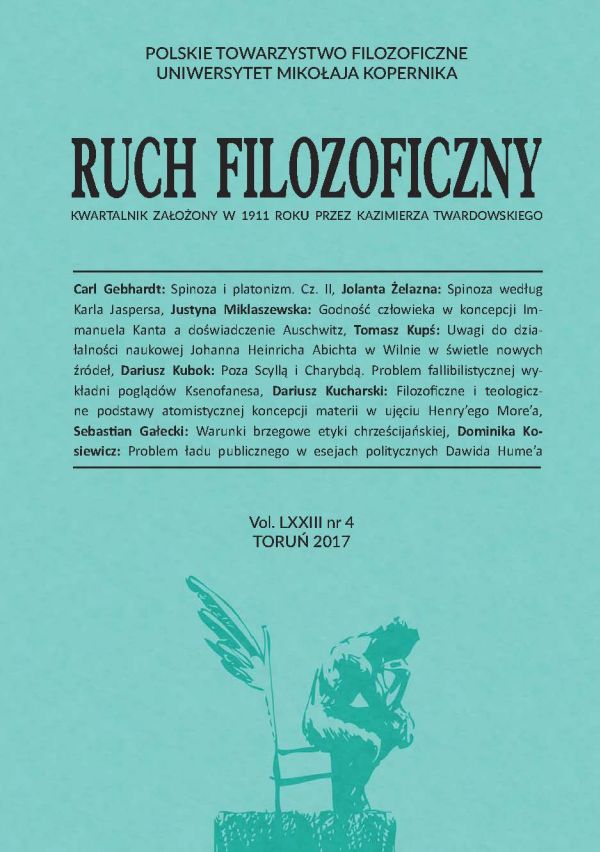Human dignity in the philosophy of Immanuel Kant - and the experience of Auschwitz
DOI:
https://doi.org/10.12775/RF.2017.034Keywords
Dignity, Kant, Holocaust, capabilities, emotionsAbstract
The aim of this article is to analyze the Kantian concept of human dignity, which in the history of philosophy, especially after the Holocaust experience, has undergone significant changes. The three concepts presented here, created by Immanuel Kant, Edith Stein, and Martha Nussbaum are representative examples of this evolution. Kant recognizes dignity as a value and defines it by referring to specifically human features: rationality and freedom. In the conceptions of Stein and Nussbaum, not reason alone but also other human powers of mind and capabilities establish the foundation of the dignity of human being, for example, emotions or imagination. In addition, Nussbaum defines dignity on the basis of liberal political philosophy as a concept used to justify citizens' claims addressed to the state. The liberal approach unites freedom and dignity of a man, as the state and its institutions are recognized here as a result of the choice made by individuals, thus combining individual responsibility for their own choices with the responsibility for the constitutional structure of the state. Indeed, the evolution of the notion of dignity in the history of philosophy consists in the change from the attitude of admiration for the values of human reason and freedom to the respect for human rights and capabilities as expressed in rational and free political action.
References
Alexander J. M., Capabilities and Social Justice. The Political Philosophy of A. Sen & M. Nussbaum, Ashgate, Aldershot 2008.
Bello A. A., Edith Stein’s Contribution to Phenomenology; A. A Bello, Edith Stein: Phenomenology, the State and Religious Commitment (w:) Phenomenology World-Wide. Foundations –Expanding Dynamics – Life-Engagements, ed. by A. T. Tymieniecka, “Annalecta Husserliana”, vol. 80, Kluwer Academic Publishers, Dordrecht, 2002, s. 232-239; s. 648-656.
Dan-Cohen M., Introduction: Dignity and Its (Dis)content, w: J. Waldron, Dignity, Rank, and Rights, Oxford University Press, Oxford 2012.
Flikschuh K., Kant and Modern Political Philosophy, Cambridge University Press, Cambridge 2004.
Guyer P., The Possibility of the Categorical Imperative, (w:) Kant’s “Groundwork of the Metaphysics of Morals”, ed. P. Guyer, Rowman& Littlefield, Lanham, Maryland 1998.
Ellis E., Kant’s Politics: Provisional Theory for the Uncertain World, Yale University Press, New Haven 2005.
Ingarden R., O badaniach filozoficznych Edith Stein, w: E. Stein, O zagadnieniu wczucia, Znak, Kraków 1988.
Kant I., Do wiecznego pokoju, przeł. M. Żelazny, Comer, Toruń 1995.
Kant I., Krytyka praktycznego rozumu, przeł. J. Gałecki, Państwowe Wydawnictwo Naukowe, Warszawa 1984.
Kant I., Metafizyka moralności, przeł. E. Nowak, Wydawnictwo Naukowe PWN, Warszawa 2005.
Kant I., Religia w obrębie samego rozumu, przeł. A. Bobko, Znak, Kraków 1993.
Kant I., Uzasadnienie metafizyki moralności, przeł. M. Wartenberg, Państwowe Wydawnictwo Naukowe, Warszawa 1984.
Kant I., Wznowione pytanie Czy rodzaj ludzki stale zmierza ku temu co lepsze?, w: I. Kant, Spór fakultetów, przeł. M. Żelazny, Wydawnictwo Rolewski, Toruń 2003.
Korsgaard C., Creating the Kingdom of Ends, Cambridge University Press, Cambridge 1996.
Lisowska U., Wyobraźnia, sztuka, sprawiedliwość. Marthy Nussbaum koncepcja zdolności jako podstawa egalitarnego liberalizmu, Wydawnictwo Naukowe Uniwersytetu Mikołaja Kopernika, Toruń 2017.
Miklaszewska J., Sprawiedliwość liberalna, Wydawnictwo Uniwersytetu Jagiellońskiego, Kraków 2015.
Nussbaum M. C., Frontiers of Justice: Disability, Nationality, Species Membership, Harvard University Press, Cambridge, MA 2006.
Nussbaum M. C., Human Dignity and Political Entitlements, w: Human Dignity and Bioethics: Essays Commissioned by the President’s Council on Bioethics, The President’s Council on Bioethics, Washington, D.C., March 2008.
Nussbaum M. C., Political Emotions. Why Love Matters for Justice, Harvard University Press, Cambridge MA 2013.
O’Neill O., Constructions of Reason, Cambridge University Press, Cambridge 1989.
Pico della Mirandola G., Oratio de hominis dignitate. Mowa o godności człowieka, przeł. Z. Nerczuk, M. Olszewski, IFiS PAN, Warszawa 2010.
Raws J., Themes in Kant’s Moral Philosophy, w: J. Rawls, Collected Papers, ed. by S. Freeman, Harvard University Press, Cambridge, MA 1999.
Reich S., Writings on Music: 1965-2000, ed. by P. Hillier, Oxford University Press, Oxford 2002.
Rosen M., Dignity: Its History and Meaning, Harvard University Press, Cambridge, MA 2012.
Sen A., Dialogue: Capabilities, Lists and Public Reason, „Feminist Economics” 2004, vol. 10, no. 3, s. 77-80.
Stein E., Budowa osoby ludzkiej. Wykład z antropologii filozoficznej (1932/33), przeł. G. Sowiński, Wydawnictwo Karmelitów Bosych, Kraków 2015.
Stein E., Filozofia psychologii i humanistyki (1922), cz. 1 i 2, przeł. P. Janik, M. Baran, J. Gaca, Wydawnictwo Karmelitów Bosych, Kraków 2016.
Stein E., O zagadnieniu wczucia (1917), przeł. D. Gierulanka, J. F. Gierula, Znak, Kraków 1988.
Szczepański J., Filozofia polityczna Immanuela Kanta, Wydawnictwo Uniwersytetu Jagiellońskiego, Kraków 2017.
Waldron J., Dignity, Rank, and Rights, Oxford University Press, Oxford 2012.
Wood A., Formulas of the Moral Law. Elements in the Philosophy of Immanuel Kant, Cambridge University Press, Cambridge 2017.
Wood A., Humanity as End in Itself, w: Kant’s “Groundwork of the Metaphysics of Morals”, ed. P. Guyer, Rowman&Littlefield, Lanham, Maryland 1998.
Żelazny M., „Fragment Krakowski” rękopisu rozprawy Kanta „Wznowione pytanie; czy rodzaj ludzki zmierza stale ku temu co lepsze?”, w: Kant wobec problemów współczesnego świata, pod red. J. Miklaszewskiej i P. Spryszaka, Wydawnictwo Uniwersytetu Jagiellońskiego, Kraków 2006.
Downloads
Published
How to Cite
Issue
Section
Stats
Number of views and downloads: 3374
Number of citations: 0



